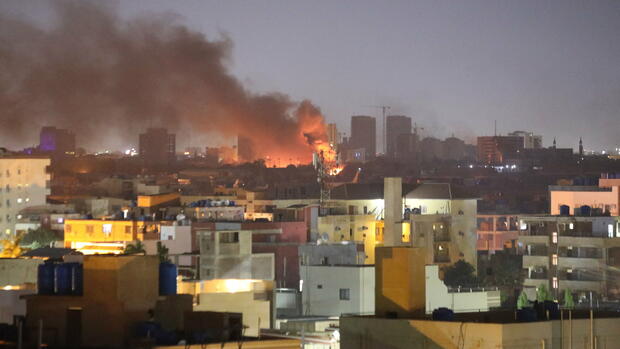More than 100 people have already died in the attacks.
(Photo: ddp/abaca press)
Cape Town Within a few hours, Sudan’s capital Khartoum and other places have turned into war zones – with air raids and street fighting. Civil flight operations have been suspended, especially at Khartoum Airport, but there has also been heavy fighting around the presidential palace in recent days. More than 100 people have now died in the fighting in Africa’s third largest country.
Four years after the overthrow of its long-term dictator Omar al-Bashir, Sudan is threatening to plunge into a new civil war. After a long period of uncertainty, cracks in the military burst open over the weekend: The background is a power struggle that has been smoldering for months between the troops of two rival generals who have ruled Sudan together since a coup in 2021. There are effectively two armies, each with their own command structures.
On one side is the regular military, which has dominated politics and the economy for over half a century. It is led by the ruling General Abdel Fattah al-Burhan, who in turn is supported by neighboring Egypt. On the other side are the “Rapid Support Forces” (RSF) of Mohammed Hamdan Daglo, better known by his nickname “Hemeti”.
Paramilitaries are supported by Russia
Born in neighboring Chad, Daglo has long funded his paramilitary forces with proceeds from gold mining in Sudan’s western province of Darfur. The region saw years of fighting between 2003 and 2008 between the Arab-dominated central government and Darfur’s black African minority. According to the UN, around 300,000 people died.
Sudanese army shells paramilitary positions
Since then, Daglo has steadily expanded his influence, sending mercenaries to Yemen and Libya. He and his RSF are mainly financed by the Gulf States and Saudi Arabia – but also by Russia. The RSF maintain close contact with the Kremlin’s Wagner mercenaries, who have been stationed in Sudan for a long time. The Russians are reportedly planning a naval base near Port Sudan on the Red Sea. This has recently led to tensions with the USA, which fears for their influence in the region.
Actually, the two armies should soon become one. The paramilitary RSF should be permanently integrated into the Sudanese military. RSF boss Daglo is demanding a period of ten years and is accusing his rival al-Burhan of clinging to power against all agreements.
Inflation has climbed to 250 percent
Whoever emerges victorious from the fighting will then face the Herculean task of rehabilitating Sudan’s already ailing economy. In the past ten years, the country’s gross domestic product has shrunk by around half, and inflation has climbed to around 250 percent. The desolate situation has a lot to do with the mismanagement under al-Bashir, who ruled from 1989 to 2019, under whose leadership 70 percent of the budget flowed into security. Another decisive factor was the loss of oil revenues, which fell to South Sudan in 2011 when it seceded from Sudan. Al-Bashir himself had never managed to successfully diversify the economy.
Dozens of civilians killed in fighting in Sudan
The oil-rich states of Saudi Arabia and the United Arab Emirates have tried to modernize Sudan’s economy and improve the country’s stability since al-Bashir’s fall four years ago. Both states have also made investments in sectors such as agriculture, where Sudan would theoretically have great potential.
How things will continue in the country, which became independent in 1956, after the apparently total rift between the generals, is currently completely open. At the beginning of the week, US Secretary of State Antony Blinken once again expressed hope that the peace process would continue and that the spiral of violence could be stopped. The situation on site itself is currently difficult to assess. The Reuters news agency reported on Monday that the regular army was said to be gaining the upper hand because of its air superiority and heavy weapons.
Also on Monday morning, RSF leader Daglo announced via Twitter that he had agreed to a 24-hour ceasefire to evacuate the wounded and civilians. Al-Burhan has not yet commented on a temporary ceasefire.
“What is happening now was always the nightmare scenario,” says Alan Boswell, Sudan expert at the International Crisis Group think tank. A long battle between the Sudanese military and the RSF could fragment the country – and further destabilize the already fragile region around the Horn of Africa.
More: Farewell to Africa in installments: the Bundeswehr is reducing its presence in Mali
